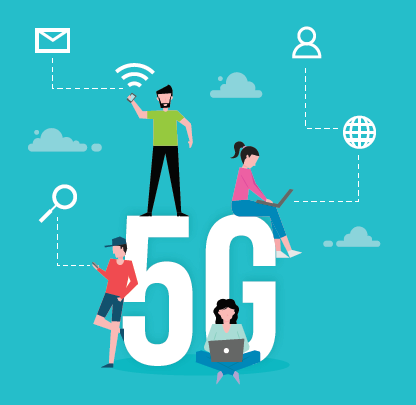Emerging Technologies
The Role of 5G in forwarding the digital revolution in India

The 21st Century is witnessing what we can say is the “Industrial Revolution 4.0”, which is being fueled by connectivity, data, and artificial intelligence. 5G- the fifth generation of wireless networks can be seen as the catalyst to this digital revolution. It is no surprise, that in the present era, data is seen as the new oil for the immense prosperity and growth it brings. In 2020, India had almost 700 million Internet users nationwide.[i] This figure is expected to rise by 2025 to more than 974 million users.[ii] In addition, India was ranked in 2019 as the world’s second-largest online market, coming second only to China.[iii] In both urban and rural areas, the number of internet users has been projected to increase, reflecting a dynamic rise in internet usage.
The ‘New India’ is turning age-old problems into new opportunities with a rapid increase in smartphone penetration. In the next two years, India’s smartphone base is expected to cross 820 million, which can unlock 80 percent efficiency improvement and 8 times less processing time for e-governance services, according to a new study.[iv] Internet has transformed the daily lifestyle of individuals right from the way we cook to the way we play games. Infusing new ideas and innovation in our day to day lives, we wake up to the sound of technology and sleep to the sound of it. A device operating without its network simply renders it lifeless. It is extremely vital, therefore to analyze the impact of the latest network on our day to day lives
The occurrence of the pandemic and the subsequent lockdown has further accelerated the process of digitization in all spheres of life. Right from the basic requirement of ordering groceries to attending online classes, managing the office via remote access, and getting online medical consultations; it is simply impossible to imagine life without the internet in these times of social distancing and quarantine.
5G vs 4G
The fifth generation of wireless networks- 5G will arrive in the market with many attractive features that set it apart from its predecessor 4G network. With the shift to the 5G network, we are moving from communication between individuals to communication between devices. An enhanced version of machine-to-machine learning (M2M), Augmented Reality (AR), Virtual Reality (VR), as well as Internet of Things (IoT), will be seen. This means that driverless cars, remote medical surgeries, drones as well as robotic applications are not mere future possibilities but upcoming realities.
| PARAMETER | 4G | 5G |
| Speed | 100 Mbps (Megabits per second)[v] | Up to 10 Gbps (Gigabits per second) peak data rates, up to 10times higher than 4G’s[vi] |
| Latency (a measure of the time it takes to transmit and receive signals) | 200 milliseconds[vii] | 1 millisecond[viii] |
EMERGING POSSIBILITIES IN VARIOUS FIELDS
AGRICULTURE
The network of 5G will prove to be quite expeditious in providing real-time feedback, thus playing an important role in the agricultural and healthcare sector. Through the use of 5G, it is possible to build agricultural solutions that use sensors. Farmers can track field conditions in real-time and be alerted when crops need irrigation, pesticides, or fertilizers. 5G having high bandwidth, will result in large files being transmitted at a high speed. The high bandwidth of 5G supports a larger number of sensors that can communicate with low latency simultaneously, making it ideal for farms. 5G promotes intelligent cultivation, which needs specific crop care. Farmers can give each row of plants exactly what it needs instead of treating an entire field the same. In order to calculate what fertilizers and pesticides need to be applied and when autonomous tractors sow the seeds, drones with sensors track the crops, and small robots take samples.[ix]
HEALTHCARE
In the healthcare sector, X-Ray Reports, Body Scan reports, etc. can be easily transferred between the patients and the doctor. Similarly, IoT devices will help in remote monitoring the health of patients, remote surgeries involving robotics can be conducted and AI can be used to determine the most accurate diagnosis, best-suited treatment for the same. In 2001, surgeons performed the first transatlantic operation in New York on a patient in France. Today, Dr. Mehran Anvari of Canada controls a robot surgeon carrying more than 20 operations on patients who might be 400 km away. The US Department of Defense aims to have a Trauma Pod by 2025 that would allow surgeons from a distance to perform operations on soldiers.[x] If implemented properly, this can particularly prove to be useful in non-urban, rural areas, or simply places that are at a large distance from healthcare facilities.
FUTURE OF THE CONSUMER EXPERIENCE
India is set to become the third-largest consumer market behind only the US and China; and India’s consumer spending is expected to rise from $1.5 trillion currently to almost $6 trillion by 2030, according to a study from the World Economic Forum.[xi] India continues to remain a hotspot for investors and multinational companies. With a massive population, coming second only to China, increasing smartphone and internet penetration, the consumer base is increasingly going online. Automated self-driven cars, companies launching Virtual Reality Stores, smart wearables as well as AI-powered Chatbots are bound to change the customer experience. 5G will have the capability to cater to a huge crowd. A new gaming experience will enable the audience to experience the live match experience from the comfort of their homes.
GOVERNANCE
In India, 5G has the ability to bring substantial social change and help the government’s infrastructure, growth, and e-governance flagship schemes. In order to help develop a realistic roadmap to introduce 5G in India, ministries and departments in the Indian government have worked on policy documents, studies and articles.[xii] A High-Level Forum had been constituted by the Ministry of Communications to study the impact of 5G on India by 2020.[xiii] Technologies related to 5G, involving AI, drones can help in smart transport, traffic management as well as disaster rescue operations. Digitizing governance will ease the process and ensure better accountability, transparency, and security. In India, crowd management during festivals and religious gatherings becomes difficult often resulting in a stampede. A 2019 Report by the Ministry of Electronics & Information Technology (MeitY) predicts that drones, surveillance cameras, and other sensory devices can be used in crowd measurement, predicting crowd movement patterns, and giving warnings for accidents.[xiv] 5G can play a huge role in enabling this.
PREDICTIONS OF A BOOMING ECONOMY
According to the Indian Government’s panel on 5G, ‘smart infrastructure’ can be developed using 5G that offers lower cost and faster infrastructure delivery.[xv] The financial advantages of 5G technology are also tremendous. According to the Committee on Digital Economic Policy of the OECD (Organization for Economic Cooperation and Development), it has been reported that the rollout of 5G technology would help to increase GDP, generate new jobs and digitize the economy.[xvi] With its immense contributions to the consumer, healthcare, agricultural, and manufacturing sector, the economy is bound to prosper. According to the Government Appointed Panel, 5G is expected to have an overall economic impact of $1 trillion by 3025. Telecommunication company Ericsson’s report says that the revenue potential for 5G-enabled digitalization in India will be above $27 billion by 2026. In addition, the Global System for Mobile Communications (GSMA)- the industry organization for mobile networks has projected that India will have about 70 million 5G connections by 2025. [xvii]
DIFFICULTIES TO BE FACED BY 5G
- Lack of Internet Accessibility
In spite of a bright predicted future, the present reality of network connectivity in India looks bleak. Even to this day, internet connectivity has not reached a majority of the population. India, which is primarily an agrarian economy, has 65% of its population living in rural areas.[xviii] While we discuss the 5G network, in reality, not even broadband connectivity, 2G or 3G has reached 70% of the rural population. As of 31st March 2020- only 29.2% of the rural population has access to the internet.[xix] There are 29.83 rural internet subscribers per 100 population in the country.[xx] The basic tenets of 5G, to provide remote accessibility, real-time sensing will be of no use if the majority of the Indian rural population can’t even get access to the basic level of network connectivity.
- Major infrastructural changes
Adapting to the new 5G network will require huge technical changes and new regulatory frameworks. This would need more circuit towers, but shorter ones than those currently used, because shorter circuit towers can be placed more closely and data latency can be minimized. Currently, a 4G base station is placed every 1-5 km but with 5G it will have to be placed every 250 m. The setting of 5G would also require redesigning of antennas so that there is less interference between the various signals that will be transmitted at the same time. These are structural changes that India does not seem ready for due to lack of funds, infrastructure.
- Debt-Ridden Telecom Sector
The three major companies consisting of Reliance Jio, Bharti Airtel and Vodafone Idea form a part of the debt-ridden telecom sector in India. Cumulatively these three companies’ debt stands at Rs 3.9 lakh crore. [xxi] The Supreme Court has allowed 10 years for telecom companies’ staggered payment of Adjusted Gross Revenue (AGR) dues.[xxii] With the exception of Jio, others are suffering huge losses and not getting sufficient revenues. Thus, telecom companies may not have the budget to buy the 3.5 GHz Spectrum which helps in the efficient development of the 5G network and is in a limited supply in India.





